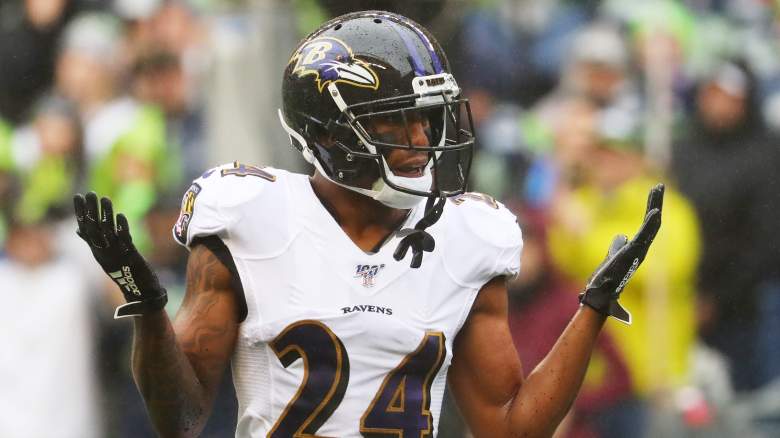
After missing the entirety of the 2021 NFL season with a torn ACL, Marcus Peters revealed on February 15 that he expects to be back to playing football in June or July, but it’s unclear if he’ll still be playing for the Baltimore Ravens.
Peters is entering the final year of his contract in 2022, and the cash-strapped Ravens might benefit from the $10 million in cap relief they’ll receive by moving on from the 29-year-old cornerback, per OverTheCap. But cutting him outright is certainly not an option for a player of his caliber, and coming off a major injury, Peters’ trade value may not be high enough for Ravens general manager Eric DeCosta to entertain any offers.
However, the Ravens have just under $9 million in cap room for the 2022 season – much less than other AFC contenders like the Chargers and the Bengals – so Peters’ $15.5 million cap hit will need to be reduced if they want to make any big-name additions, like All-Pro safety Tyrann Mathieu. That could lead to an extension that would reduce Peters’ 2022 cap hit and keep him in Baltimore for years to come.
Experts disagree on whether the Ravens should keep Peters in Baltimore. Some argue that his return will be crucial to improving Baltimore’s 32nd-ranked pass defense in 2020, while others think that the Ravens can accept a necessary downgrade from Peters through the draft or the team’s existing cornerback depth.
The Case to Extend
Alex Kay of Bleacher Report thinks that the Ravens would be wise to keep Peters around for 2022 and beyond, as he’s clearly important to the team’s defensive success.
After multiple seasons as a top-ranked defense, the Ravens fell to the bottom-half of the league in both points and yards allowed, and Kay believes that the Peters “was a key reason for that regression.”
Recent comments from Ravens general manager Eric DeCosta indicate that the team feels the same way.
“Marcus is one of these guys that, when he comes to your organization, he provides such an authentic perspective on what this game is all about,” said DeCosta on February 4, “He’s a Raven.”
DeCosta even compared Peters to notable past Ravens acquisitions like Michael McCrary, Anquan Boldin, Steve Smith Sr. and Matt Birk for how he has impacted the culture in Baltimore. Fans need only look at his sideline activity against his former team, the Los Angeles Rams, for evidence of his dedication to the Ravens despite his injury.
“I would expect Marcus to be here…and I can’t wait to see him,” concluded DeCosta.
But the Ravens’ salary cap situation may force DeCosta to put his money where his mouth is and extend Peters to free up some cap space this offseason. Baltimore has turned to Peters for financial flexibility before; per Kay, they freed up $3.5 million with a contract restructure in March 2021, which almost completely paid for the addition of veteran outside linebacker Justin Houston.
Kay wrote on February 17 that a three-year, $45 million extension would be appropriate for a player of Peters’ caliber and importance to the Ravens.
The Case to Trade
But with the Ravens working on a massive contract for Jackson – as well as signing tight end Mark Andrews and offensive lineman Patrick Mekari to extensions in 2021 – they may not have enough space to extend Peters.
That’s why Kay’s Bleacher Report colleague Gary Davenport thinks that Peters could be on the trade block this offseason.
“The financial realities [the Ravens] face and Peters’ value as a tradeable asset are factors general manager Eric DeCosta will bear in mind the next time his phone rings,” wrote Davenport on February 19.
The Ravens may have to move on from Peters to free up enough space to re-sign pending free agents like center Bradley Bozeman or defensive lineman Calais Campbell.
While Peters is coming off a down year followed by an ACL tear, he’s still a three-time All-Pro at one of the NFL’s most important positions.
“Outside of quarterbacks, offensive tackles and maybe edge-rushers, cornerbacks are arguably the most valuable players in the league,” wrote Davenport, arguing that there are plenty of potential Peters suitors.
Even if the Ravens want to avoid trading Peters to an AFC contender, teams like the San Francisco 49ers and the Philadelphia Eagles could use a proven corner like Peters. While a first-round pick might be too steep a price, a second-rounder might be fair compensation.
The Verdict
Trading Peters should be an absolute last-resort for the Ravens. He’s a high-caliber cornerback who will be difficult to replace internally or through any draft compensation received in a deal.
Instead, the Ravens should prioritize extending Peters before the start of free agency in March, ensuring that he remains in Baltimore for years to come while also giving the team more short-term flexibility.
The only remaining question would be the length and total value of such an extension.
Re-upping Peters on a deal similar to his three-year, $42 million deal signed in 2019 could make sense for the Ravens, but he request a raise closer to the $15 million average annual value suggested by Kay.
The Ravens should be able to make that work, especially if they slightly backload the contract with the league salary cap expected to increase considerably in the coming years.
Comments
Trade or Extend?: NFL Analysts Disagree on Marcus Peters’ Future with Ravens